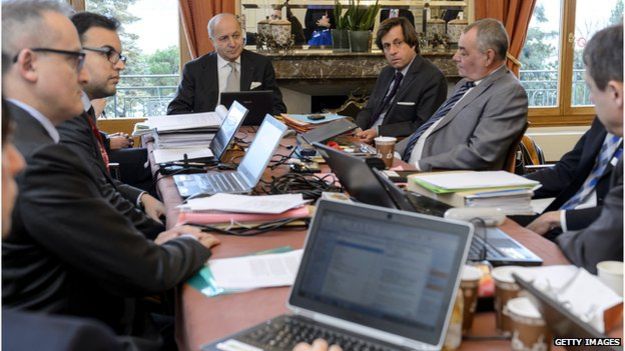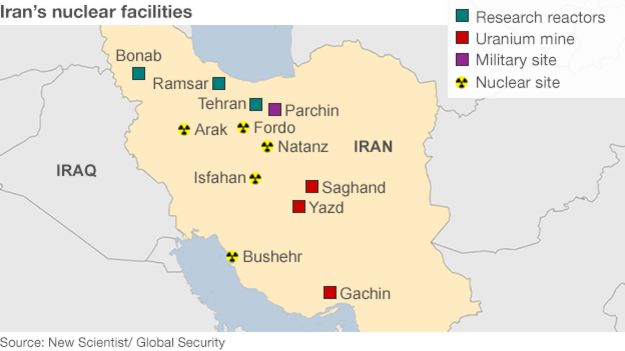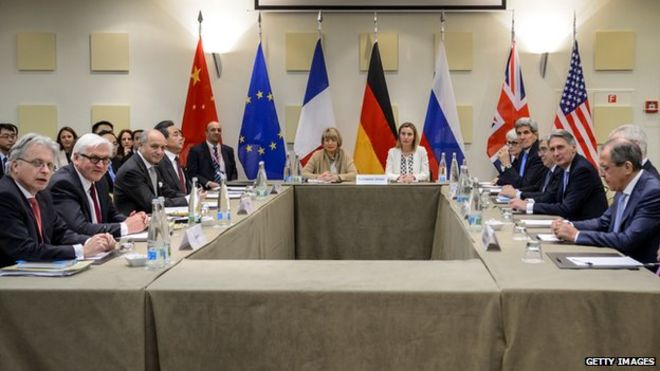Iran nuclear talks: Intensive talks before key deadline
Intensive talks have resumed in Switzerland ahead of Tuesday's deadline for a nuclear deal with Iran.
Ministers from six world powers are expected to hold their first full session on Monday with Iran's foreign minister.
The essence of an emerging deal is to keep Iran at least one year away from being able to produce enough nuclear fuel for a single weapon.
In return, Iran would see an easing of economic sanctions.
Iran denies trying to develop nuclear arms saying its programme is peaceful.
Representatives from the US, Germany, France, the UK, China and Russia are at the talks in Lausanne.

Bilateral talks and national working sessions, like this French one, have also been taking place
The two sides have explored compromises in areas including the number of centrifuges used to enrich uranium that Iran could operate, and its nuclear enrichment work for medical research. Restrictions on Iran's nuclear work could last at least a decade, and include rigorous inspections.
Despite progress, disagreements remain on how long Iran would be subject to constraints, and on the speed of sanctions' relief, says the BBC's Barbara Plett-Usher in Lausanne.
At their meeting with Iranian Foreign Minister Mohammad Javad Zarif, the other representatives will be aiming to agree on a political framework by Tuesday night that would set the stage for technical talks.
US officials said all parties have agreed to a "step-by-step approach" to reaching a deal, but sticking points remain.

At the scene: Lyse Doucet, BBC News, Lausanne
Negotiators are close, closer than ever before, in their 12-year stand-off over Iran's nuclear programme. But a deal is still not done, and no-one can say with 100% certainty if it will be.
With each day that slips by before an end-of-March deadline for a framework agreement, the political temperature rises against the serene backdrop of the snow-capped Swiss Alps. As foreign ministers and officials stream in and out of meetings in the gilded Beau Rivage, snippets and statements to the persistent press play into 11th-hour brinkmanship.
The last difficult details are as much about political power as they are about nuclear energy. Both Iran and world powers urge the other side to make tough decisions. All say they've come here, hoping to make a deal, to make history.
Beyond this rarefied world, sceptics wait in many capitals, ready to react if, in their view, a bad deal emerges. Reaching what counts as a "good deal" for all will go right down to the wire and, possibly, beyond.

The world powers, known as the P5+1 group - the five permanent members of the UN Security Council plus Germany - want to ensure that Iran cannot develop nuclear weapons.
Iran is hoping that a deal will lead to the lifting of international sanctions that are affecting its economy.
German Foreign Minister Frank-Walter Steinmeier said there had been "some progress and some setbacks in the last hours".
"I can't rule out that there will be further crises in these negotiations," he told reporters in Lausanne.
Other potential sticking points include how much of Iran's nuclear facilities will be open to inspection.
Meanwhile, Israel's Prime Minister Benjamin Netanyahu has again warned against a deal with Iran, describing the deal under discussion as worse than his country had feared.
On Sunday, he told a cabinet meeting: "This deal, as it appears to be emerging, bears out all our fears, and even more than that."

What do they want?
- The United States, Britain, France, Germany, Russia and China want a suspension of Iran's most sensitive nuclear work for more than 10 years
- Iranian negotiator Hamid Baidinejad has said "15 years is out of the question" but "10 years is being discussed"
- Iran had originally insisted on keeping nearly 10,000 centrifuges in operation
- In November, Washington indicated it could accept around 6,000
- Iranian officials say they have been pushing for 6,500-7,000

do not forget to comment, like and share.

No comments:
Post a Comment